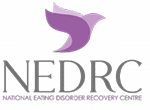National Eating Disorders Recovery Centre
First in Eating Disorders
What are NEDRC’s programmes?
NEDRC addresses the intense emotional aspects related to food and weight, providing fact-based education about health, diet, and exercise to each client, the underlying issues and the maintaining factors of the eating disorder. Our services are available to all genders and age groups from 12 years.
In-patient programme 8 beds, (Programme treatment 12-weeks, research shows when patients with an Eating Disorder are discharged too soon from in-patient treatment or lack of follow on care, there is an increased risk of relapse) intensive treatment- psychological, therapeutic and nutritional ongoing support. Furthermore, from our own teams’ experience there are many patients who will be ready for discharge after 12-weeks in-patient treatment, however, we have also treated patients that have been discharged at 12-weeks and were not yet ready, as a result typically those not ready to be discharged are at higher risk of relapse.
NEDRC’s inpatient service can be offered to for example St Vincent’s University Hospital as a step down (once medically stabilised) or NEDRC’s day programme for those patients at risk of needing admission.
Day programme- Day Hospital (Monday-Friday, group therapy also includes individual sessions and reviews by medical, Dietetic and therapeutic team) suitable for patients who do not need the intensity, support and observations of in-patient treatment or for patients as a step down post in-patient treatment.
Out-patient care (Individual appointments with members of the medical, Dietetic and therapeutic team as required to either prevent admission or prolong recovery).
After-care/ after treatment (Support for up to two years post discharge from our treatment programmes) to ensure patients are maintaining their discharge plan and recovery.
Adolescent programmes
Our Psychologists, Therapists, Dieticians, Social Worker and our Nurses- ANPc, Mental Health and Pediatric Nurses work directly with parents, families, and other services as required; to provide support, education, and address concerns during the treatment process.
Our Adolescent programmes are a unique service that parents have been looking for quite some time, however, now more than ever, parents and their loved ones need an experienced, passionate team to provide a quality, patient focused service to maintain their children’s mental health during these difficult times and the aftermath.
Adolescent Day Programme- Day Hospital
In addition to providing appropriate therapeutic and nutritional interventions, our program works around the school calendar to ensure each patient’s academic needs can continue, as well as educating the schools if required, about the needs of students struggling with this illness.
Our primary goal is to ensure patients receive the best care, allowing them to succeed in all areas of their lives providing individualised care, addressing the Eating Disorder symptoms as well as helping each patient reduce existing concerns and anxieties as much as possible.
We will provide a programme, that when appropriate, allows patients to stay home in their own environment with families and be an extended part of the patient’s care and treatment. We will provide an early intervention service, treating the young person before the Eating Disorder becomes too ingrained in their cognition and takes over their life. Our aim is to try prevent a young person from requiring inpatient treatment.
The young person’s nutritional needs are taken care of while at the Adolescent Day Programme, this is a huge relief and reassurance for parents who may be struggling on a daily basis with their love one.
Adolescent out-patients
The young person is appointed a Psychologist/ Therapist and Dietician whom will treat the patient individually on an out-patient basis. Assessment and reviews take place as and when required.
The Irish Medical Journal, January 2021 reported a 66% increase in child and adolescent referrals for Eating Disorders since March 2020.
Outcome measures and evaluations of our care
Staffing training and education: Our staff are currently up-to-date with best practice recommended care interventions for treating patients with an Eating Disorder. It is the commitment of the NEDRC to all staff and patients that staff will continuously develop professionally. As an organisation NEDRC will provide the funding and time for staff to follow through with this.
Patient outcomes: On admission each patient will be provided with a self-assessment document of their current health (physical and mental), their social and work engagement levels and their main presenting complaints, along with what they would like to achieve. A midway treatment self-assessment document is provided to patients to fill out answering the same questions. Again, at discharge, patients are given a self-assessment document. Finally, at 12-weeks post discharge patients are given (at their 12-week review appointment) the self-evaluation to complete. The Quality Management team will review and compile all relevant information in order to assess our programmes, treatment, care and patient outcomes. The aim of this is to continuously improve our service we provide to our patients and to ensure we are providing the best care possible.
Patients’ family/ loved ones are also encouraged to complete our feedback evaluation forms. This is also reviewed by the Quality Management team whom make recommendations for how to proceed with any areas for improvements identified.

“They may forget your name, but they will never forget how you made them feel”
Families are an important part of the recovery process and we encourage their participation but only with your consent. We also understand that not everyone has a relationship with their family and would not force this connection.
About Us
The National Eating Disorders Recovery Centre (NEDRC) supports a realistic view to health and weight. We incorporate WHO, NICE, MEED and the HSE Model of Care for Eating Disorders guidelines along with elements of Health at Every Size (HAES) principles, Intuitive Eating and Therapeutic Movement. We approach each individual with a holistic view, using the Medical (where needed), Therapeutic, Psychosocial and Recovery models.

Start your recovery journey today
Give us a call to schedule an appointment.
Phone: 01 564 4450 / 087 7755996




